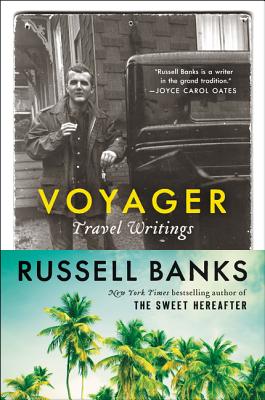The acclaimed, award-winning novelist takes us on some of his most memorable journeys in this revelatory collection of travel essays that spans the globe, from the Caribbean to Scotland to the Himalayas
Now in his mid-seventies, Russell Banks has indulged his wanderlust for more than half a century. In this compelling anthology, he writes that since childhood he has “longed for escape, for rejuvenation, for wealth untold, for erotic and narcotic and sybaritic fresh starts, for high romance, mystery, and intrigue.” The longing for escape has taken him from the “bright green islands and turquoise seas” of the Caribbean islands to peaks in the Himalayas, the Andes, and beyond.
In Voyager, Russell Banks, a lifelong explorer, shares highlights from his travels: interviewing Fidel Castro in Cuba; motoring to a hippie reunion with college friends in Chapel Hill, North Carolina; eloping to Edinburgh to marry his fourth wife, Chase; driving a sunset-orange metallic Hummer down Alaska’s Seward Highway.
In each of these remarkable essays, Banks considers his life and the world. In Everglades National Park, he traces his own timeline: “I keep going back, and with increasing clarity I see more of the place and more of my past selves. And more of the past of the planet as well.” Recalling his trips to the Caribbean in the title essay, “Voyager,” Banks dissects his relationships with the four women who would become his wives. In the Himalayas, he embarks on a different quest of self-discovery. “One climbs a mountain, not to conquer it, but to be lifted like this away from the earth up into the sky,” he explains.
Pensive, frank, beautiful, and engaging, Voyager brings together the social, the personal, and the historical, opening a path into the heart and soul of this revered writer.
“If the United States were to adopt Japan’s admirable policy of designating a few extraordinary individuals as Living National Treasures, Russell Banks would be my first nomination.”—Michael Cunningham
“Russell Banks is a writer in the grand tradition. It is quite natural, in speaking of Banks’s great works of fiction, to think of such predecessors as Conrad, Tolstoy, and Chekhov—and closer to his American home, such predecessors as Jack London, Theodore Dreiser, Hemingway, Dos Passos, Faulkner, and Nelson Algren. He has acquired an international reputation for the intensely wrought, uncompromising, and intransigent moral vision that has suffused virtually all of his work. He has created art of a kind that speaks to all classes, not merely to the elite, and yet has done so scrupulously and thoughtfully.”—Joyce Carol Oates











